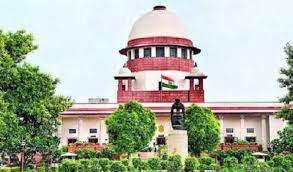NEW DELHI: A CJI-led seven-judge Constitution Bench of the Supreme Court on Tuesday commenced hearing the contentious issue of minority status for Aligarh Muslim University (AMU) – eight years after the BJP-led NDA government sought to withdraw the Centre’s appeal against an Allahabad High Court ruling that it was not a minority institution.
The Bench which also included Justice Sanjiv Khanna, Justice Surya Kant, Justice JB Pardiwala, Justice Dipankar Datta, Justice Manoj Misra and Justice KV Vishwanathan will examine if an educational institution created by a parliamentary statute could enjoy minority status under Article 30 of the Constitution which empowers religious and linguistic minorities to “establish and administer” educational institutions.
A three-judge Bench headed by the then CJI Ranjan Gogoi had on February 12, 2019 referred to a seven-judge Constitution Bench the issue of minority status of AMU.
On behalf of the petitioners, senior advocate Rajeev Dhavan began making submissions.
The Constitution Bench will examine the correctness of a 2006 judgment of the Allahabad High Court, declaring that the AMU was not a minority institution.
On behalf of the AMU, senior counsel Rajeev Dhavan had earlier contended the constitutional issues involved were important as the top court in its seven-judge bench verdict in the TMA Pai case in 2002 did not clarify as to what should be the requirement for establishing a minority institution.
If the Supreme Court finally declared the AMU a minority institution, SCs, STs and OBCs will not get reservation in admission.
The verdict would set a judicial precedent for a similar legal battle over the status for the Jamia Millia Islamia University, which was declared a minority institution during the UPA government in 2011.
The AMU and the then UPA government had challenged the 2006 Allahabad High Court verdict in the Supreme Court.
However, the BJP-led NDA government in 2016 told the top court that it would withdraw the appeal filed by its predecessor government as “the previous stand was wrong”.
It said a five-judge Constitution bench in 1968 in the Aziz Basha case had held that the AMU was a “central university” and not a minority institution. It maintained that the AMU was not a minority institution as it was set up by the government and not by Muslims. After the 1968 verdict, the AMU (Amendment) Act, 1972, and thereafter 1981 came into force.
The Allahabad High Court had in January 2006 struck down the provision of the 1981 amendment Act by which the university was accorded the minority status.
In its affidavit, the Narendra Modi government had earlier sought to withdraw all letters issued by the Ministry of Human Resource Development (MHRD) under the UPA government allowing the AMU to reserve 50% of its seats for Muslims in the faculty of medicine.
The NDA government had quoted former prime minister Indira Gandhi who had told Parliament during a debate in 1972 that “if this demand (minority status to AMU) is conceded, the government cannot resist similar demands from other minorities, religious as well as linguistic.”


